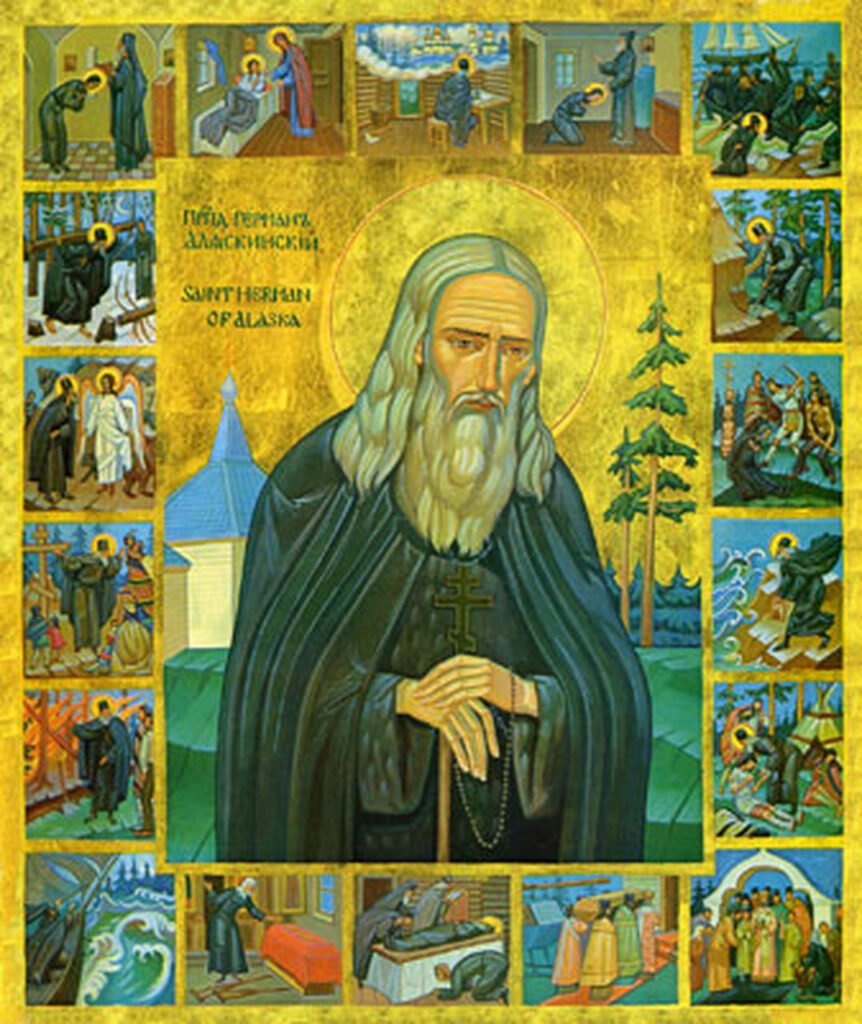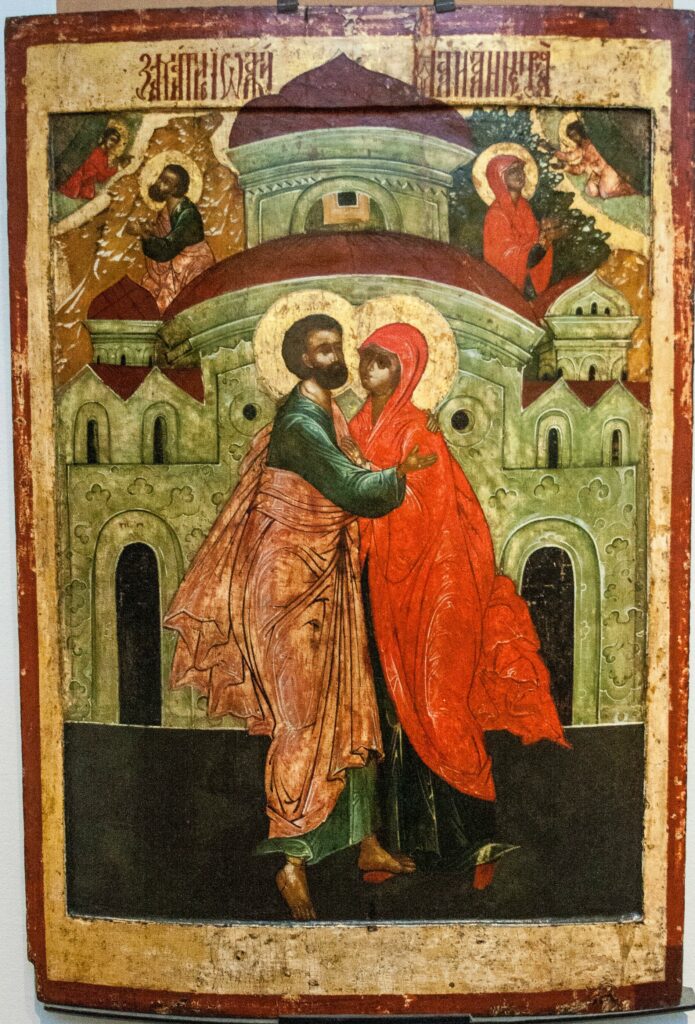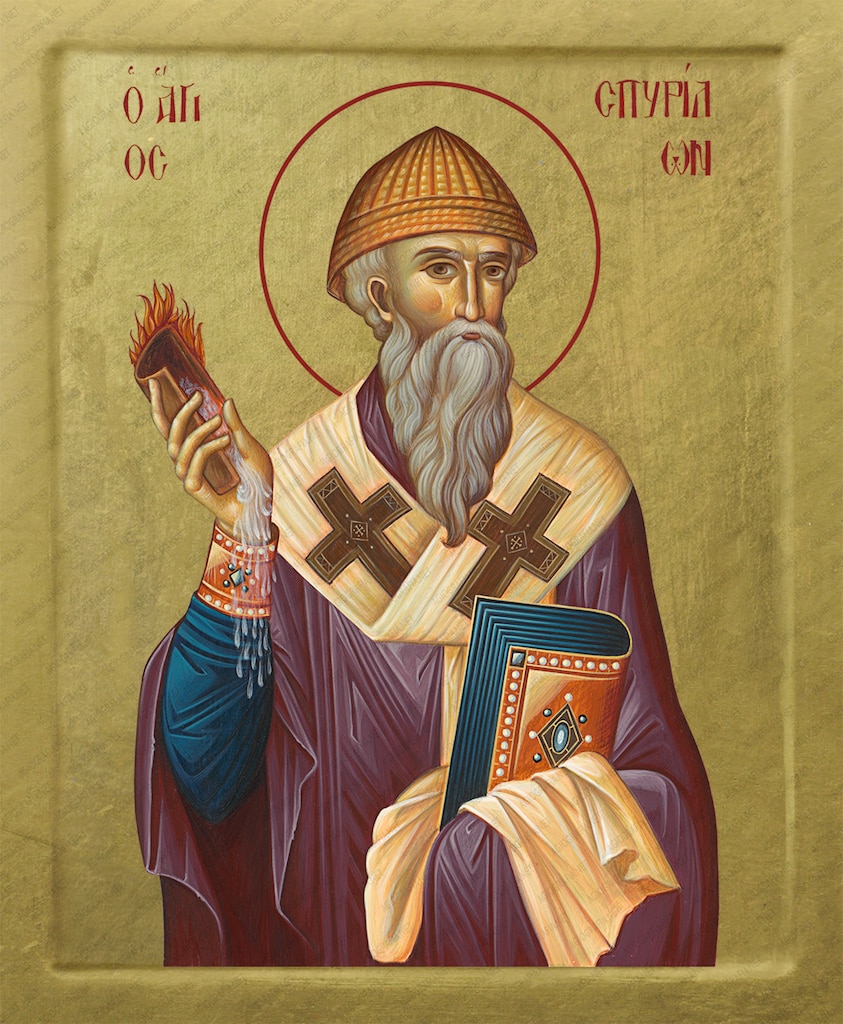Dear Friends
Our preparations for Christmas continue: how are you preparing? We await with great anticipation the coming of the Lord to the cave as our Saviour. His birth was a surprise to the Shepherds and his star a wonder to the Wise Men yet we join in with the Angels,
Glory to God in the highest,
And on earth peace, goodwill toward men!
Luke 2:14
The fast gives us an opportunity to reorientate ourselves to the Lord by service to others — our actions towards the weak, and strong, demonstrate our faith in Christ.
As I mentioned in last week’s email, Friday 6th December marked the feast of one of the most beloved saints in all Christendom, St Nicholas the Wonderworker, Archbishop of Myra. Yesterday, after the Sunday Liturgy at St Dunstan’s Church, Poole, we served the Artoklasia (or Litiya, see further down) in his honour: we commemorated each of you by name asking for the great wonderworker to act in each of your lives. Our purpose, as Christians, is to pray and to offer up all we have to the Lord: this was an important event in the creation of our community.
We are still waiting on news for the Church building. We suspect we will not hear in December because of their own preparations for Christmas but, God-willing, we will hear in the New Year. In the medium term, though, if we want to offer regular services to God in Eastleigh at times of our own choosing we should already be thinking about our own building. This could be,
- an existing Church,
- an existing Chapel,
- a hall,
- a house,
- a shop,
- a warehouse,
- a garage,
- etc., etc., etc.
Do you know of anywhere? This would require much work and sacrifice on all of our parts: please pray and ask the Lord how he wants you to serve.
Artoklasia
The blessing of five loaves — along with wheat, wine and oil — serves as a part of an evening Vigil service and was originally meant to provide sustenance for the faithful during the longer services held on feast days. Artoklasia is a Greek word meaning literally “breaking of bread.” It is held now, often at the end of the Liturgy, to honour the saint or feast being commemorated. Afterwards, those present are invited to take some of the bread with them as a blessing to them.
The text of the service can be read here (pdf).
Resources
Have you looked at our Website? orthodoxeastleigh.uk
It is very basic at the moment. If you click on the “Blog” link, or directly here, you will see all past emails as well as sermons etc. I have a friend of mine who is currently looking to spruce up the page: I hope to inform you soon with more information about this.
Our Facebook Page, facebook.com/orthodoxeastleigh, too has daily additions during the week as well as on feast days. Please do like and share our page and content so we may reach a wider group of people.
Monday 9th December — The Conception of the Theotokos by the Righteous Anna
The entire history of Israel led up to this moment. The Righteous Joachim and Anna had been praying for a child and from them came the one who, in complete purity, was able to say to the Archangel, “Behold the maidservant of the Lord! Let it be to me according to your word.” (Luke 1:38) Only through her faithfulness was Christ able to come into the world. Yet the faithfulness of children is so often associated with the faithfulness of their parents and we can, today, commemorate the faithfulness of two who are so often mentioned by name in our divine services.
Thursday 12th December — St Spiridon of Trymithous the Wonderworker
St Spiridon was a humble bishop in Cyprus who faithfully preached the truth. A beautiful story of his faithful humility is told about when he was at the First Ecumenical Council.
The grace which worked in Saint Spyridon proved to be more powerful in clarifying matters than all the rhetorical knowledge which the others possessed. At the invitation of emperor Constantine, there were a number of Hellenic philosophers who were called “perinatitiki” present at the Nicaean Council. Among these philosophers was one who was very wise and adept, and, a supporter of Arius. His sophisticated rhetoric was like a two edged sword which cuts deeply. He boldly attempted to destroy the teaching of the Orthodox.
The blessed Spyridon requested an opportunity to address that particular philosopher. Because this bishop was a simple man who knew only Christ, and Him crucified, the holy fathers were hesitant to let him speak. They knew that he had no knowledge of Hellenistic learning and were afraid to allow him to match verbal skills with such philosophers. But Spyridon knowing the strength and power which is from above, and how feeble human knowledge is in comparison to that might, approached the philosopher, saying to him, “In the name of Jesus Christ, listen to me and hear what I have to say to you.”
The philosopher, looking at this country bishop, felt somewhat amused. Quite assured that his own rhetorical talents would make the simple cleric look like a fool, he proudly replied, “Go ahead, I am listening.”
The saint began, “God, who created heaven and earth, is One. He fashioned man from the earth and created everything that exists, both visible and invisible, by His Word and His Spirit. That Word, we affirm, is the Son of God, the true God, who showed mercy on us who had gone astray. He was born of the Virgin, lived among men, suffered the passion, died for our salvation and arose from the dead, raising the human race together with Himself. We await His coming again to judge all with righteousness and to reward each one according to his faith. We believe that He is consubstantial with the Father, dwelling together with Him and equally honored. We believe all these things without having to examine how they came to be; nor should you be so brazen as to question them, for these matters exceed the comprehension of man and far surpass all knowledge.”
Silent for a moment, the bishop then continued, “Can’t you now realize how true all of this is, O philosopher? Consider this simple and humble example: We are created and mortal beings and are not worthy to resemble the One who is divine in being and ineffable. Since we tend to believe more readily through what the eyes perceive than through what we merely hear with our ears, I want to prove something to you using this brick. It is composed of three elements which combine to make it one single being and nature.”
Saying this, Saint Spyridon made the sign of the holy Cross with his right hand while holding a brick in his left hand, and he said, “In the name of the Father and of the Son and of the Holy Spirit,” while squeezing the brick. At once, flames rose into the air, water poured down upon the ground and clay alone remained in his hand!
Those who were eyewitnesses to this miracle were filled with fear, especially the philosopher. He remained speechless, like one who had been mute from birth, and found no words to respond to the saint in whom Divine power had been manifested, according to what is written: “The kingdom of God is not in words, but in power.” (1 Cor. 4:20)
Finally, humbled and convinced, the philosopher spoke, “I believe what you have told us.”
Saint Spyridon said to him, “Then come and receive the sign of holy faith.”
The philosopher turned to his colleagues and his students who were present and said, “Listen! As long as someone questioned me verbally, I was able to refute their statements with rhetorical skills. But my words fail against this elder who, instead of using mere words, has worked through power and miracles. My rhetoric is futile against such a might, for man cannot oppose God. If any of you feel as I do, let him then believe in Jesus Christ and follow this elder together with me. God Himself has spoken through him.”
Then the philosopher accepted the Christian faith, rejoicing that the saint had overcome his own logic. All the faithful were glad, and the Arian heretics were at a loss.
It was Saint Spyridon’s vital participation in the Council of Nicaea which led the God-inspired Church hymnographers to compose words such as these for his service:
“Your words adorned the Church of Christ, and in your deeds you offered glory to the Image of God, blessed Spyridon.”
Friday 13th December — St Herman of Alaska
St Herman was a simple monk, called from the west of Russia to live in Alaska. There his simple but profound faith led him to stand with the Aleut tribe against the aggression and cruelty of Europeans. Can we, like St Herman, stand with the oppressed and downtrodden in Eastleigh and throughout the region? Can we learn the way to true mission is by humble service and love? Are we reflecting the love of God which we have received freely to others?
Can I help you?
I am here for you, you need only ask. Is there a way I can support your life of faith? Get in touch.
Can you help the mission?
I am hopeful that we will start to meet and hold divine services soon: for this to happen we will need the prayers of you all. Please hold me and each other in your prayers before God that we may be able to offer praise to God as a worshipping community.
With love in Christ
Fr Alexander
webenquiry@orthodoxeastleigh.uk



